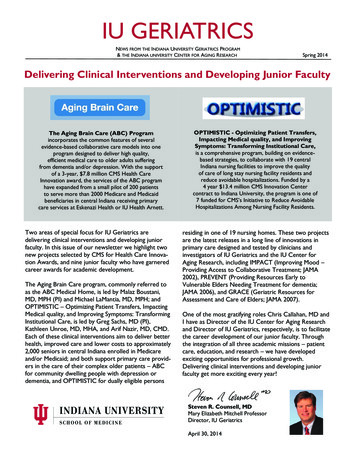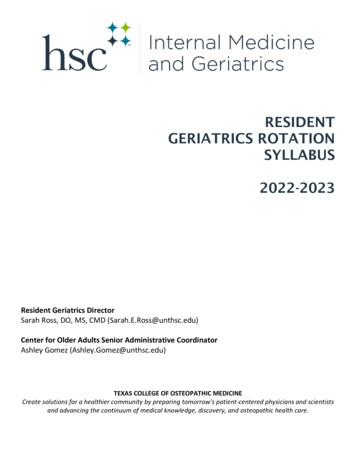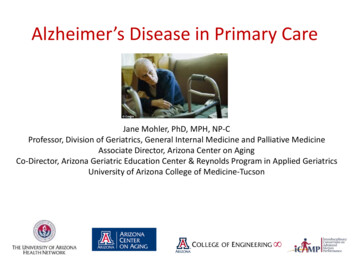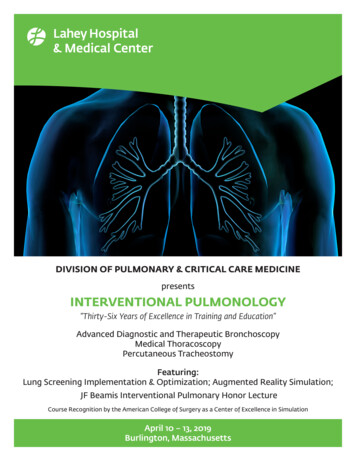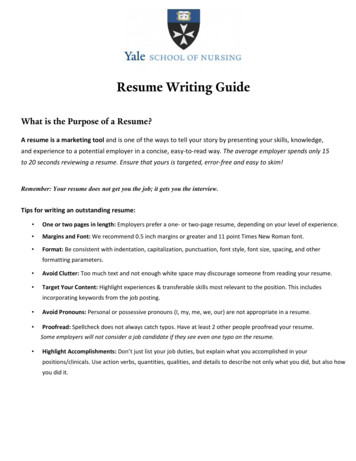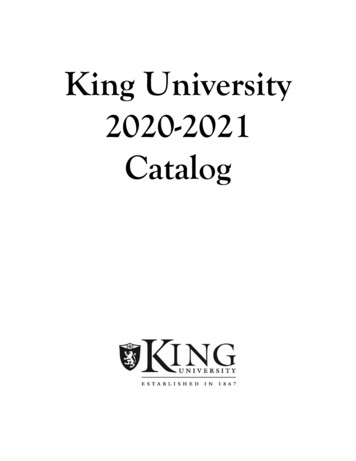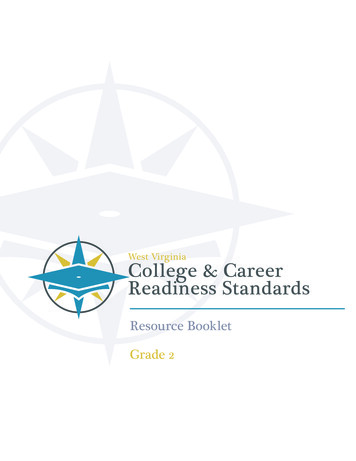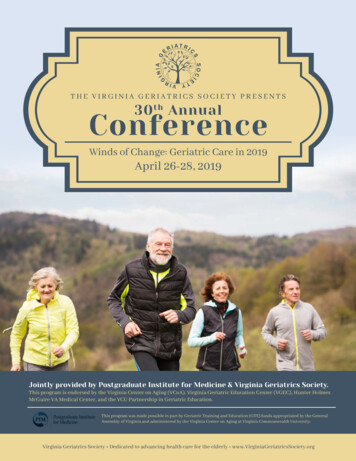
Transcription
THE VIRGINIA GERIATRICS SOCIETY PRESENTSth30AnnualConferenceWinds of Change: Geriatric Care in 2019April 26-28, 2019Jointly provided by Postgraduate Institute for Medicine & Virginia Geriatrics Society.This program is endorsed by the Virginia Center on Aging (VCoA), Virginia Geriatric Education Center (VGEC), Hunter HolmesMcGuire VA Medical Center, and the VCU Partnership in Geriatric Education.This program was made possible in part by Geriatric Training and Education (GTE) funds appropriated by the GeneralAssembly of Virginia and administered by the Virginia Center on Aging at Virginia Commonwealth University.Virginia Geriatrics Society Dedicated to advancing health care for the elderly www.VirginiaGeriatricsSociety.org
Planning CommitteeChairPeter Boling, MDCommittee MembersEdward Ansello, PhDChristian Bergman, MDDaniel Bluestein, MDStacey Dean, PharmDKathy Fletcher, RNMichael Godschalk, MDRachel Selby-Penczak, MDCourse DescriptionThis program has been designed to meet the educational needs of Physicians, Nurse Practitioners, Registered Nurses, Physician Assistants, andPharmacists in the fields of geriatrics, family medicine and primary care and involved in the care of older patients.Topics will include the latest information on diagnosis, management, treatment and health policy for common problems in the aging population.The 30th annual meeting of the Virginia Geriatrics Society will provide information designed for front-line care providers, including insight fromexperience and review of recent research which will help participants to improve their care of older adults.Learning ObjectivesAs a result of attending this activity, the participant will be able to: Discuss current management issues for individuals with dementia, including assessment, recognition of concurrent depression, recognition of moretreatable forms of dementia Discuss cases that reflect pharmacologic management of patients at high risk of atherosclerotic thrombosis including stroke and heart attacks inolder adults Optimize treatment of heart failure, including both systolic and diastolic function, how to use the both standard therapies and the newest drugs in themarket, and how to identify patients with “senile cardiac amyloidosis” Describe how to use non-opioid drugs for treatment of chronic pain List 3 changes in practice he/she will make as a result of attending this conference Select appropriate forms of treatment for depression in the elderly including patients with dementia Determine which drugs to use for platelet inhibition in patients with atherosclerotic disease, in primary and secondary prevention Select drugs for treating challenging cases of diabetes in older patientsVirginia GeriatricsSocietyVirginiaCommonwealthUniversityVGS is an affiliate of the AmericanGeriatrics Society. Membershipin VGS provides priority access toall educational opportunities, freecontinuing education units (CEsand CMEs) at dinner meetings,discounted registration fee forthe annual Virginia GeriatricsConference, networking withGeriatrics and Gerontologyprofessionals and opportunityto impact Geriatrics at the stateand national levels. Cost ofmembership is just 50 annually.Virginia Commonwealth Universityis an equal opportunity/affirmativeaction institution providing accessto education and employmentwithout regard to age, race, color,national origin, gender, religion,sexual orientation, veteran’s status,political affiliation or disability.Individuals with special needs(mobility, access, etc.) shouldcontact Christine Heubusch at(434) 977-3716 ext. 23 orchristine.heubusch@easterassociates.com.Virginia Geriatrics Society 2019 Annual ConferenceSupportAcknowledgementFunding for this program isprovided by the Bureau ofHealth Professions (BHPr),Health Resources and ServicesAdministration (HRSA),Department of Health and HumanServices (DHHS), under Grant No.UB4HP19210 to Virginia GeriatricEducation Center.
The VirginiaGeriatrics Societyis committed to advancing health carefor the elderly through:Promoting high standards ofhealth carefor the elderly and to advance the quality ofepisodic and long term institutional and noninstitutional care in the Commonwealth ofVirginia.Assisting in the educationof medical students and physicians and otherhealth care personnel in issues of particularconcern regarding the elderly.Educational CreditJoint Accreditation StatementIn support of improving patient care, this activity has beenplanned and implemented by the Postgraduate Institute forMedicine and Virginia Geriatric Society. Postgraduate Institutefor Medicine is jointly accredited by the American Council forContinuing Medical Education (ACCME), the AccreditationCouncil for Pharmacy Education (ACPE), and the AmericanNurses Credentialing Center (ANCC), to provide continuingeducation for the healthcare team.Physician Continuing Medical EducationThe Postgraduate Institute for Medicine designates this live activity for a maximumof 20.0 AMA PRA Category 1 Credit(s) . Physicians should claim only the creditcommensurate with the extent of their participation in the activity.Continuing Pharmacy EducationPostgraduate Institute for Medicine designates this continuing education activityfor 20.0 contact hour(s) (0.20 CEUs) of the Accreditation Council for PharmacyEducation. For specific UANs for each activity, please click here. Pharmacists haveup to 30 days to complete the evaluation and claim credit for participation so thatinformation can be submitted to CPE Monitor as required.Fostering professional andpublic awarenessconcerning issues in geriatric medicine.Encouraging and promotingresearchContinuing Nursing Educationin the broad field of geriatrics and gerontology.The maximum number of hours awarded for this Continuing Nursing Educationactivity is 20.0 contact hours. Pharmacotherapy contact hours for Advance PracticeRegistered Nurses to be determined.Serving as a forumfor discussion of issues pertaining to geriatricmedicine by concerned physicians and healthprofessionals.Acting as a resourceto professional and lay organizations,government agencies, and communityprograms in the areas of care of the elderly.Fostering the above objectivesin cooperation with theAmerican Geriatrics Societyand to coordinate activities with otherprofessional societies and interested groupsregarding issues in geriatrics.Join us Friday for our AnnualDinner!Registration is just 10.00. See registration formfor details.American Academy of Family PhysiciansApplication for CME credit has been filed with the American Academy of FamilyPhysicians. Determination of credit is pending.Disclosure Of Conflicts Of InterestPostgraduate Institute for Medicine (PIM) requires instructors, planners, managers,and other individuals who are in a position to control the content of this activity todisclose any real or apparent conflict of interest (COI) they may have as related tothe content of this activity. All identified COI are thoroughly vetted and resolvedaccording to PIM policy. PIM is committed to providing its learners with high qualityactivities and related materials that promote improvements or quality in healthcareand not a specific proprietary business interest of a commercial interest.Americans with Disabilities ActEvent staff will be glad to assist you with any special needs (i.e., physical, dietary, etc.).Please contact Christine Heubusch prior to the live event at christine.heubusch@easterassociates.com or 434-977-3716 ext. 23Virginia Geriatrics Society 2019 Annual Conference
RICHMONDAs the capitalof Virginia,Richmond invitesthe world tocome explore herbeauty, historyand culture.Richmondabounds withopportunities forfun, recreationand relaxation.Hilton Richmond Hotel (ShortPump)The Hilton Richmond Hotel & Spa willwelcome our guests with charming Southerncomforts and hospitality. Accommodationsat the hotel will be available at reduced ratesstarting at 155 per night. The room block willbe available until 5 PM on Thursday, April 4,2019 or until the rooms sell out, whichevercomes first.Reservations may be made by calling theHilton directly at 1-804-364-3600 or online.(Please mention you are with the VirginiaGeriatrics Conference.)Friends & FunFrom shopping at the nearby Short PumpTown Center to dining in the historic ShockoeSlip district to visiting one of the many worldclass museums in the area, there’s somethingfor everyone in Richmond. Learn more aboutthings to do by visiting visitrichmondva.com.Please plan to attend the Friday afternooncocktail reception, immediately followingthe lectures. Saturday evening allows plentyof time to experience all the beauty, culture,history and atmosphere of Richmond.Friday ReceptionJoin us Friday at 5:30 p.m. after the lastgeneral session to help kick-off theconference. Light hors d’oeuvres will be servedduring this one-hour reception.This is the perfect opportunity to meet withthe vendors whose support helps makethe conference possible and network withattendees and speakers who work in the fieldof geriatric care.Exhibitor BingoDon’t forget to visit each exhibitor booth while you’re at the conference and complete your exhibitor BINGO card. All completed cardswill be entered in a drawing to win prizes at the meeting! Take advantage of scheduled times with exhibitors during breakfast and/orbreaks Friday through Saturday.Virginia Geriatrics Society 2019 Annual Conference
FacultyVGS faculty is carefully chosen by the planning committee for their experience and expertise ina range of fields that impact geriatric care. Each presenter brings a unique skill set and trainingbackground to create a well-rounded series of lectures designed for a multidisciplinary group ofattendees providing a full spectrum of care.Bob Adler, MDRobert Palmer, MDChristian Barrett, MDLauren Pamulapati, PharmDPeter Boling, MDSeema Patel, MDKen Brummel-Smith, MDShriti Patel, MDAnita Clayton, MDKrishnasree Rao, MDPatricia Fulco, PharmDChris Rembold, MDSoundarya Gowda, MDSangeeta Sastry, MDMayer Grob, MDSamantha Schaller, PharmDSarah Hobgood, MDJon Snider, MDCarol Hurst, PhD, MSW, LCSWDavid Spiegel, MDJennifer Inker, MS, MBA, PhD, LALFAKristin Williams, MDDenise Lowe, PharmDFrank Zieve, MDVirginia Geriatrics Society 2019 Annual Conference
AgendaFriday, April 266:30 AM6:30 - 7:30 AM7:30 - 8:30 AMRegistration OpensBreakfast with Exhibitors & Exhibitor Bingo BeginsYet Another UTI? / Sangeeta Sastry, MD8:30 - 9:30 AMAdvanced Diabetes Management Using Newer Options / Lauren Pamulapati, PharmDObjectives: 1) Review circumstances in which additional diagnostic tests for causes of recurrent urinary infections should beundertaken; 2) Discuss use of preventive antibiotics to suppress recurrent urinary infections; 3) Summarize evidence related touse of preventive therapies like cranberry products.Case-based discussion by an infectious disease consultant of strategies in recurrent UTIs, including when and how to 1) definecriteria for diagnosing a UTI; 2) when and how to look for stones, masses and other foreign bodies as causes; 3) use of prophylacticantibiotics – when, as well as which drugs are appropriate; 4) understand evidence related to use of cranberry products.Objectives: 1) Review guidelines for care of Type II diabetes in the elderly, taking into account the results of Advance and Accordclinical trials; 2) List groups of patients for whom tighter control is warranted; 3) In older patients where tighter control iswarranted, review approaches to use of newer agents to achieve better control; 4) Briefly review use of new glucose monitoringdevices.Case-based discussion led by a clinical pharmacist on the use of contemporary diabetes drug agents: drug classes of interestincluding DPP4 inhibitors like sitagliptin (Januvia) or linagliptin (Tradjenta); SGLT2 inhibitors like canagliflozin (Invokana) ordapagliflozin (Farxiga); GLP-1 receptor agonists like exenatide (Byetta), liraglutide (Victoza), dulaglutide (Trulicity); and variousinsulins such as insulin determir (Levemir) and insulin glargine (Basaglar, Lantus). Further, do the “Freestyle” meters work, andwhen should they be used?9:30 - 10:00 AM10:00 - 11:00 AMBreak with Exhibitors11:00 AM - NoonTo Treat or Not to Treat: Prostate Cancer 2019 / Mayer Grob, MDNoon - 1:00 PM1:00 - 2:00 PMArteritis: Is This Headache Benign or a Potential Killer? / Seema Patel, MDObjectives: 1) Describe the clinical features and diagnostic assessment of cranial arteritis, including temporal arteritis and howthese symptoms are distinct from other headaches; 2) Review recommended treatment when suspecting cranial arteritis.Presentation will be made by a rheumatologist who is an expert in arteritis. Primary care clinicians often question if headachesreported by older patients are in fact migraines, TMG, or may reflect more serious conditions, such as temporal arteritis. In thissituation, what is the best approach to diagnosis and management?Objectives: 1) Review current status of recommendations on prostate cancer screening; 2) Outline innovations in treatment thatoffer improved outcomes with less morbidity; 3) Summarize the long-term results of definitive treatment in early stage disease; 4)Describe circumstances under which the strategy recommended would be watchful waiting rather than active treatmentDiscussion by a urologist specialized in prostate cancer on newer treatment modalities and how watchful waiting works whenthere is a diagnosis of cancer that lacks aggressive characteristics. Further, who should be screened with PSA testing, and whenshould we biopsy?Lunch with ExhibitorsFinding a Time & Place for Addressing Intimacy in the Care of Older Patients / Anita Clayton, MDObjectives: 1) Review facts about sex practices and preferences of older patients; 2) Discuss strategies to include sex as a topic inpatient care; 3) Describe interventions that may improve sexual function and satisfaction in older patients.This presentation will provide primary care providers with an update regarding a topic that is often lost in the rush of other issuesthat fill the time when patients and providers meet. Sex is often not discussed, though sexual function is impacted by conditionsand treatments (drugs) and is often an important concern that patients are uncomfortable raising for discussion. Medical treatment choices can impact sexual function, going beyond the common issue of male erectile dysfunction.2:00 - 3:00 PMGetting People Vaccinated, Don’t be a Vector or a Victim / Denise Lowe, PharmD3:00 - 3:30 PM3:30 - 5:30 PMBreakClinical Decisions, Antiplatelet Therapy: Which Drugs, and for How Long? / ChristianBarrett, MD & Chris Rembold, MDObjectives: 1) Describe the efficacy of commonly-employed older adult vaccines (e.g. flu, pneumonia, shingles); 2) Outlinepreferred schedules for vaccination when multiple vaccines are given; 3) Review the true side effects and special considerationsneeded when advising patients.This talk by a clinical pharmacist will address general subjects in the process of a vaccines update. These topics will include: vaccines against zoster and a comparison of two on the market (i.e. Shingrix and Zostavax), with discussion of their efficacy, cost, sideeffects, coverage, and discussion of if you should you take the vaccine if you have had shingles; the two pneumococcal products(original and Prevnar) and the duration of their effect and recommendations for timing and sequencing; the influenza vaccine andif a high-dose vaccine is better, does it cost more or have more side effects and who should get it), timing during the year, and whatthe difference is between the nasal form vs. shot, and why would it not be recommended in elderly?Objectives: 1) Review the main therapeutic antiplatelet therapy options in current practice; 2) Describe the tests now available toevaluate effectiveness of anti-platelet therapy; 3) Summarize key findings from the literature and recommendations regardingclinical effectiveness of anti-platelet therapyWide-ranging clinical discussion by expert hematologist and cardiologist about use of antiplatelet therapy in primary and secondary prevention, starting with basic aspirin at various doses, including its use for primary prevention in light of the large ASPREEtrial; tests of platelet inhibition (PYP12 and aspirin aggregation); and practical recommendations for when to look to other newerantiplatelet drugs such as clopidogrel, ticagrelo, prasugrel abciximab, eptifibatide, and tirofiban.5:30 - 6:30 PM6:30 - 8:30 PMNetworking Reception & Poster PresentationsMembership Dinner (preregistration required)Virginia Geriatrics Society 2019 Annual Conference
AgendaSaturday, April 276:30 AMRegistration Opens6:30 - 7:30 AMBreakfast with Exhibitors7:30 - 8:30 AMOf Horses & Zebras: Recognizing Reversible Cases of Dementia / Kristin Williams, MD &Sarah Hobgood, MDObjectives: 1) Describe several causes of dementia for which there are potentially curative treatments; 2) Review how to clinicallydistinguish the uncommon potentially reversible cases of dementia from the more common conditions.Discussion by geriatrician and dementia-specialized neurologist regarding relatively rare but important reversible causes of dementia, when one should recognize this among the more common cases of irreversible dementia, and how to evaluate accordingly.8:30 - 9:30 AMClinician’s Dilemma: Depression, Dementia, Both? What to Do? / Shriti Patel, MD & David Spiegel, MDObjectives: 1) Review best practices with regard to detecting the presence of depression in older patients; 2) Describe approachesto distinguishing the affective flattening seen in dementia from depression; 3) Outline how and when to consider electroconvulsive therapy in older patients; 4) Summarize best options for pharmacologic therapy in geriatric depression.Two speakers from psychiatry will take a practical clinical approach to the topic of depression in the elderly, talking about how todistinguish affective flattening in dementia from depression and related management, considering ECT for geriatric depressionwhen appropriate, and options for drug therapy of geriatric depression.9:30 - 10:00 AM10:00 - 11:00 AMBreak with Exhibitors11:00 AM - NoonStrange Neurologic Spells: How to Make Sense of Them / Soundarya Gowda, MDNoon - 1:00 PM1:00 - 2:00 PMStiff, Weak and Slow: Is It Parkinson’s or Something Else? / Jon Snider, MDObjectives: 1) Describe clinical conditions that are on the “Parkinson’s disorder spectrum” but are not Parkinson’s disease, featuresand prognosis, including development of dementia; 2) Outline how to distinguish Parkinson’s disease from other similar conditions; 3) Review how treatment approaches may differ in these situationsSession in which movement disorder neurologist will explore Parkinson’s spectrum disorders and other conundrums, involvingshaking, stiffness, weakness, and trouble with walking and movement control that are not primary Parkinson’s (vascular Parkinsonism, progressive supranuclear palsy, Bickerstaff syndrome, corticobasal degeneration) and may not respond to Parkinson’smeds. Discussion will address where Lewy Body dementia and Parkinson’s-related dementia fit in, as well as the role of newtherapeutic options such as pimavenserin for management.Objectives: 1) Describe clinical features of non-convulsive epilepsy and how to evaluate for this condition; 2) Outline what distinguishes TIAs from other kinds of temporary neurologic syndromesSession will address the problem of poorly-understood episodes of altered mentation and behavior that may represent transientischemia (TIA), seizure disorders, generalized and atypical, with specific focus non-convulsive seizures (temporal lobe epilepsy);episodes that manifest as behavioral disturbances when there is often difficulty making a definitive diagnosis; and how to diagnose and how to treat such as with drugs, like valproic acid, topiramate, lamotrigine, levetiracetam, lacosamide.Lunch & Final Break with ExhibitorsWhat to Do About Agitated Behaviors in Dementia / Peter Boling, MD & Robert Palmer, MDObjectives: 1) Review current recommendations for management of agitated behaviors in patients with dementia; 2) Summarizethe evidence of benefit and harm coming from use of antipsychotic medication for this problemTwo senior geriatricians will engage in a debate regarding the pros and cons of using drug therapy to control agitated behaviorsin patients with dementia; in the process, they will review the current guidelines and the scientific foundations related to development and use of those guidelines and will take a practical approach to an issue that is a common and difficult one in geriatric care.2:00 - 3:00 PMA Case-Based Approach to HIV in the Geriatric Population / Patricia Fulco, PharmD3:00 - 3:15 PM3:15 - 5:15 PMBreakNon-Opioid Approaches to Managing Chronic Pain / Samantha Schaller, PharmD & KenBrummel-Smith, MDObjectives 1) Describe the prevalence of HIV infection in the geriatric population; 2) Review prognosis of HIV disease with currenttherapy; 3) Summarize how treatment of HIV disease, drug interactions, and other factors may impact care of primary care patients, along with the role of clinical pharmacistsThis presentation by a clinical pharmacist who has specialized in HIV disease for many years will address in practical terms howprimary care providers may be impacted by HIV-infected patients, and how they can best contribute to their care.Objectives: 1) Describe the relevant pharmacology of non-opioid medications 2) Review best practices when prescribing non-opioid medications for chronic painSamantha Schaller will speak for the first hour of the session. As a clinical pharmacy specialist who coordinates an opioid riskmitigation clinic, she will address the pharmacology and the evidence for effectiveness of non-opioid drug therapy in chronicpain. In the second hour of the session, Ms. Schaller will team up with Dr. Brummel-Smith for a case-based discussion and toanswer questions about clinical conundrums that face primary care providers.Virginia Geriatrics Society 2019 Annual Conference
AgendaSunday, April 286:30 AM6:30 - 7:15 AMRegistration OpensBreakfast Discussion: THC & CBD Treatment Options (non-CE) / Ken Brummel-Smith, MD7:30 - 8:30 AMTarget Lipids: How Low Should We Go and for Whom? / Frank Zieve, MD8:30 - 9:30 AMBetter Bones? The Latest on Vitamin D & Other Drugs / Bob Adler, MD9:30 - 10:00 AM10:00 - 11:00 AMThis special non-CE breakfast session will be presented by Dr. Brummel-Smith, an experienced geriatrician who has been studying use of cannabis products in medical care for several years. He will discuss a range of topics, including efficacy and risks ofthese agents, the variable quality of products on the market, and how medical practitioners should handle requests from patientswho are interested in using these products.Objectives: 1) Review the evidence supporting primary prevention of atherosclerotic events in older age; 2) Summarize the findings of clinical trials for secondary prevention of atherosclerotic events in older age; 3) Describe the evidence of side effects fromthe statin medication group; 4) Discuss subsets of older patients for whom continued use of statins in advanced older age may notbe worthwhile. This session will cover which patients of advanced age and/or poor health really should take medications to lowercholesterol, as well as which people might not benefit from treatment, despite guidelines for acute stroke and acute coronarysyndrome. It will also review situations where we are quick to start drugs regardless of age and health status and ask the questionof whether everyone with a risk factor should stay on statins for life; further, if we stop statin use, when should we stop? Are therereasonable alternatives to statins? How common are the frequently-reported muscle pains, are these true statin ADRs, and arethere others to consider (cognitive decline, hepatic dysfunction)? Finally, who should consider a PCSK9 drug (Praluent, Repatha)if we can find a way to pay for it?Objectives: 1) Review latest data on benefits of Vitamin D supplements for various different groups; 2) Summarize recent data onuse of medicines to enhance bone health; 3) Outline optimal strategies for bone health management among the older-old.The speaker will guide primary care providers who are seeking to enhance patients’ bone health with discussion of controversiesrelated to use of Vitamin D. The session will cover pertinent data and decision-making related to effectiveness of meds for osteoporosis other than oral bisphosphonates, drugs including injected bisphosphonates and PTH analogues, such as denosumab,abaloperatide, teriparatide, zoledronic acid.BreakAgeist Bias: How Common Is It Among Professionals & Patients / Jennifer Inker, MS, MBA, PhD,LALFA & Carol Hurst, PhD, MSW, LCSWObjectives: 1) Give examples of how expectations about aging may influence patient decision-making; 2) Identify ways in whichhealth care professionals may unwittingly bring bias into the patient care process.This presentation by an experienced gerontologist and a social worker will use videotape triggers to develop a conversation withthe audience about some of the inherent biases that many of us may carry, even those interested in geriatric care and our agingpatients.11:00 AM - NoonPriming the Pump: Management of Heart Failure in Older Patients / Krishnasree Rao, MDObjectives: 1) Outline preferred tactics in contemporary management of systolic and diastolic phase heart failure;2) Describe the newly defined problem of cardiac amyloidosis; 3) Discuss use of recently-introduced new modalities such as neprilysin inhibitors and indwelling pulmonary artery pressure monitors.This session will cover an overview of geriatric heart failure physiologic basics; differentiate between systolic and diastolic CHF;and review newer concepts of heart failure etiology, including senile amyloidosis and diastolic failure and what we have learnedfrom 3T cardiac MRI studies. It will also summarize CHF treatment options and what strategies and drugs work best for systolicCHF and Diastolic CHF (including neprilysin inhibitors), while touching on the role of new technologic CHF interventions (suchas indwelling pulmonary artery pressure monitoring devices) and the factor of age when it comes to heart transplant eligibility.Eco-Friendly Conference DetailsAccess to presenter slides will be made available through an online attendee portal to save paper and make for a less bulky registrationpack. These presentations will be available for you to print prior to the conference, if received by the faculty presenter. We encourage you tobring your laptop or other portable device to the sessions in order to access the learning materials, as needed during the conference, withoutthe need for paper copies. Printed binders can be purchased for an extra fee with registration but will not be available for purchase at theconference.By registering for thisevent, you acknowledgeand agree to grant VGS theright to record, film andphotograph your likenessin its media, marketing,promotional andeducational efforts.“It was an excellent conference, the speakers had a wealth of information.”“Best clinically-based conference for the care of the elderly population!”“Overall great experience and needed conference.”“Great conference - look forward to next year!”“This was my third VGS conference and I was not disappointed.”Virginia Geriatrics Society 2019 Annual Conference
2019 Registration FormEarly RegistrationLate Registration(after 3/31/19)On-Site Registration 450 500 525Non-MD 350 400 425Non-Member 500 550 575 400 450 475 200 200 215Registration Type(before 3/31/19)VGS MemberPhysicianVGS Member(Physicians-in-training,Pharmacists, Nurse Practitioners,Physician -training,Pharmacists, Nurse Practitioners,Physician Assistants)Qualified StudentsQualified students must show currentproof of enrollment in a Medical PA, NP,RN, MSW/BSW, Pharmacy program, etc.*Daily RegistrationConference BinderVGS Member Dinnero Friday 275o Saturday 255 o Sunday 195 o Saturday & Sunday 450Printed Conference Binder 45Please note: Conference binders are printed several weeks ahead of the conference, and may contain outdated materials. Binders ONLY contain 3-slide per page printouts of presenterslides, updated versions of which are available on the attendee portal.o I plan to attend the VGS Member Dinner. 10o I plan to bring # of guests to the VGS Member Dinner. 10/eachTOTAL ARMACISTS ONLY: NABP ID No.: DOB:Home Address:City: State: Zip Code:Daytime Telephone: Email Address:Will you attend the Friday evening Networking Reception from 5:30 p.m. - 6:30 p.m.? o Yes o NoAre you a first time attendee? o Yes o NoHow did you hear about the conference? o Email o Website o Colleague Referral o AGS Email o OtherMail registration form to Christine Heubusch, VGS Conference Coordinator, 250 West Main Street, Suite 100, Charlottesville, VA 22902. To pay by credit card, registration isavailable online at www.vgsconference.org.For phone inquiries or special needs contact Christine Heubusch at (434) 977-3716 ext. 23. No registration refunds will be given afterMarch 31, 2019. Refund requests will be subject to a 50 administrative fee.Deposit Check Rec’dInit:Date:Check#:* Qualified students must email a copy of their valid student ID to christine.heubusch@easterassociates.com.Virginia Geriatrics Society 2019 Annual Conference
McGuire VA Medical Center, and the VCU Partnership in Geriatric Education. This program was made possible in part by Geriatric Training and Education (GTE) funds appropriated by the General Assembly of Virginia and administered by the Virginia Center on Aging at Virginia Commonwealth University.


